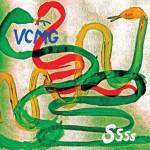
VCMG Ssss
(Mute)
VCMG stands for Vince Clarke and Martin Gore, the two original members of Depeche Mode, together only for the 1981 debut Speak & Spell. While Martin Gore went on to conquer the world of electronic and synthpop music with Depeche Mode, Vince Clarke did the same, first with Yazoo, later The Assembly, and finally with Erasure. On Ssss (a name whose origin is harder to discern than the band name), Clarke and Gore reunited (well, sort of: all the music here was done through file swapping) to create an hour’s worth of somewhat minimalist techno.
Fans of Speak & Spell may be disappointed by a shortage of anything you can dance to; fans of Martin Gore may be disappointed by the lack of emotion; fans of Vince Clarke may be disappointed by how one-note it is. Isolated, none of these are necessarily a negative thing, but taken together, they add up to a lazy effort mostly devoid of chemistry, somewhat unsurprising since these two lacked personal contact with each other while making the music. Ssss certainly has its highlights, such as Windup Robot’s shockingly effective distorted beat following the bridge, Single Blip’s captivating use of synth in the outro, or Aftermath’s syncopated and stereo-dependent warmer, slower synths, but you have to sit through several minutes of what sounds either like lasers from a George Lucas movie or forgettable and standard beats to get to the good parts. Most of the intrigue—the punctum, if you’ll allow—relies as much on anticipation as it does on the personal touch. Zaat indulges in so much repetition that a listener might be forgiven for mistaking it for a Philip Glass work if not for the lack of any noteworthy or captivating change; Recycle and Skip This Track’s titles are the only parts of this album that do not insult the listener with unfulfilled promises of sensibility.
It’s not that the beats on Ssss are bad, or that the songs as are nauseatingly repetitive. As a whole, the album does not struggle particularly with either. The issue is that the beats are just weak enough to bore us with their repetitiveness, but the progression takes us away from what we want to hear before we are given a chance to appreciate it. Given a choice of direction and movement or necessary stasis, Clarke and Gore seem to make the wrong decision just at the moment it becomes the wrong decision to make. The songwriting isn’t spectacular, especially for these two, but it definitely is not bad, either. Certainly, it’s good enough to make Ssss better than it is. But for some reason, probably not unrelated to the lack of personal chemistry that can be developed through emailing files, Clarke and Gore seem to pull away from one another almost as often as they work together. Beyond the lack of innovation, there seems to be a lack of understanding. The soundscape is thin enough to want a specific mood but the production is too scattered to suggest it.
Moments of Ssss are exhilarating, but they are short moments, hampered by disappointing beats when VCMG opt for repetition and by rushing when they hit the mark. These songs run too long, unsure of what they are or want to be. Worse, for every impressive mark, every Lowly bridge or Flux assurance, there is a mark as infuriatingly unfulfilling not far away—probably persisting for a longer time on an unnecessarily elongated song. Through headphones, Ssss lacks proper punctum. Through speakers, it fails to infect.
30 March, 2012 - 08:25 — Forrest Cardamenis